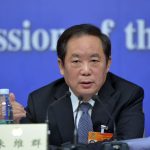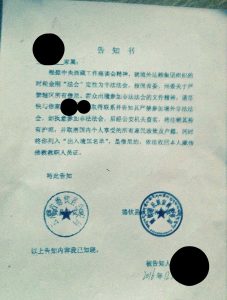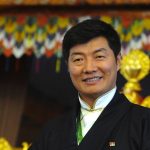Tibetan and Human Rights groups have spoken out against Chinese obstruction of Tibetan religious and civil freedoms in the run up to His Holiness the Dalai Lama’s 2017 Kalachakra celebration, amid Chinese denials of interference in the matter.
The Chinese government prevented thousands of Tibetans attending His Holiness’s Kalachakra initiation, which took place in Bodhgaya earlier this month, instituting a programme of temporary legal and travel restrictions on native Tibetan residents of the Chinese-controlled region. Tibetans were also banned from marking the festival, or sharing recordings or written material relating to the teachings, under threat of imprisonment.
Political commentators have speculated that the Chinese response to the event may have been exacerbated because of its association with the Central Tibetan Administration who officially requested and organised the teachings.
Chinese officials have denied accusations of government interference in the matter, dismissing evidence and accounts to the contrary, and denouncing the celebration as a “political tool” and focal point for Tibetan separatism.

Zhu Weiqun
“The number of Tibetans attending the ritual [has] decreased dramatically in recent years after the local governments clarified to local Tibetans that the ritual is about separatism, and also due to tightened border control,” said Zhu Weiqun, chairman of the Ethnic and Religious Committee of the Chinese People’s Political Consultative Conference. “The India-based ceremony frequently degenerates into a political tool,” he later said, accusing attendees of “hating the Chinese government”.
 The Tibetan Centre for Human Rights and Democracy (TCHRD), a Dharamshala-based non-government organisation, published a statement condemning Chinese interference in Tibetan religious expression: “The Tibetan Centre for Human Rights and Democracy strongly condemns the systematic violation of the right to freedom of religion and belief of the Tibetan people and calls on the Chinese authorities to stop the illegal and unconstitutional practice of targeting Tibetans for practicing their religion”.
The Tibetan Centre for Human Rights and Democracy (TCHRD), a Dharamshala-based non-government organisation, published a statement condemning Chinese interference in Tibetan religious expression: “The Tibetan Centre for Human Rights and Democracy strongly condemns the systematic violation of the right to freedom of religion and belief of the Tibetan people and calls on the Chinese authorities to stop the illegal and unconstitutional practice of targeting Tibetans for practicing their religion”.

Directive issued by Dechen County Police and Government
Photo: TCHRD
TCHRD reported that in the Tibetan prefecture of Duchen, Kunnan province, two government directives had been published relating to the Kalachakra festival. The first prohibiting attendance at the festival and the second, the possession, or sharing, of any text, image or recording of the event. These directives were to be enforced under offences relating to Illegal Gatherings, Public Order, Endangering the State (includes separatism), which carry maximum prison terms of 15 days, five years and Life, respectively.

Lobsang Sangay
The Prime Minister of the Tibetan Government-in-Exile, Dr Lobsang Sangay, also decried the tactics, saying “Thousands of pilgrims have come from Tibet purely to take part in a spiritual event. They have attained legal permit to travel here. The Chinese government threatening Tibetan pilgrims to return immediately under such severe pressure is simply unacceptable. It is in clear violation of International human rights norms”.
His Holiness the Dalai Lama delivered special audiences and teachings to Tibetans who had arrived in India to attend the Kalachakra, but were returning home early because of the Chinese threats. His Holiness assured the Tibetans who could not make the ceremony that they too would receive its blessing, saying “Distance cannot dampen the sacred ties between a lama and a disciple. You can all pray from the far-flung areas in Tibet and I assure you that you will receive the Kalachakra empowerment”.
Meanwhile, some people in Qinghai province were able to discreetly observe the Kalachakra celebration in defiance of Chinese authorities. A local source told Radio Free Asia, “In my village people are engaged in virtuous activities such as fasting, performing prostrations, and setting animals free…[and] in other places, too”.
 These most recent actions of the Chinese government have also gained attention in the Western media, with the Washington Post publishing the story of one Tibetan pilgrim who attended the event despite the threats to his family, together with an in-depth analysis of the situation.
These most recent actions of the Chinese government have also gained attention in the Western media, with the Washington Post publishing the story of one Tibetan pilgrim who attended the event despite the threats to his family, together with an in-depth analysis of the situation.




 Print
Print Email
Email